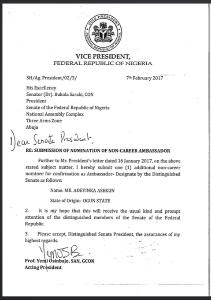The Senate President Bukola Saraki on Wednesday at plenary, read four letters conveying the decision of Acting President Yemi Osinbajo to veto four bills recently passed by the National Assembly and transmitted to the Presidency for assent .
The bills are Dangerous Drugs (Amendment) Bill 2016; National Lottery Act (Amendment) Bill; Currency Conversion Forfeiture Bill Amendment Bill; and Agriculture Credit Guarantee Scheme Fund Bill.
The Acting President cited pending legal cases and the fact that some of the words and phrases in the bills were at variance with the spirit of the proposed changes as the reasons for his action.
Osinbajo hinged his rejection of the National Lottery Amendment Bill on the grounds of a pending legal case.
“The rationale for withholding assent to the bill is the existence of pending legal challenge to the competence of the National Assembly to legislate on the subject matter.”
On the Dangerous Drugs Amendment Bill, the Acting President said he withheld his assent because of certain words and phrases construed to be inconsistent with the spirit behind the amendment.
“The rationale for withholding assent to the bill are the concerns regarding certain words and phrases utilized in the draft bill that maybe inconsistent with the principal act and the spirit behind the proposed amendments,” he said.
On the Agriculture Credit Guarantee Scheme Fund bill, Osinbajo raised concerns on funding and composition of the board.
“The reason for withholding assent to the bill are the concerns surrounding board composition, funding arrangements, limitation of liability of funds and proposal to increase levels of uncollateralized loans from N5,000 to N250,000.”
Concerning the Currency Conversion Bill, he wrote that: “The rationale for withholding assent to the bill is the concern regarding the modalities for the communication of asset forfeiture orders.”
Meanwhile, the Senate President has said that the decision of the Acting President would be studied by the legal team of the Senate with the view to determine the upper chamber's next course of action on the matter.













